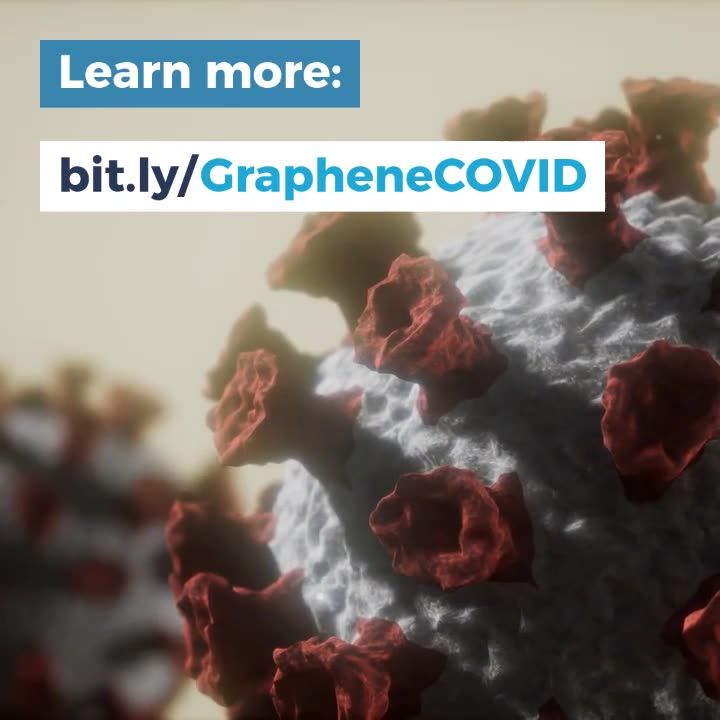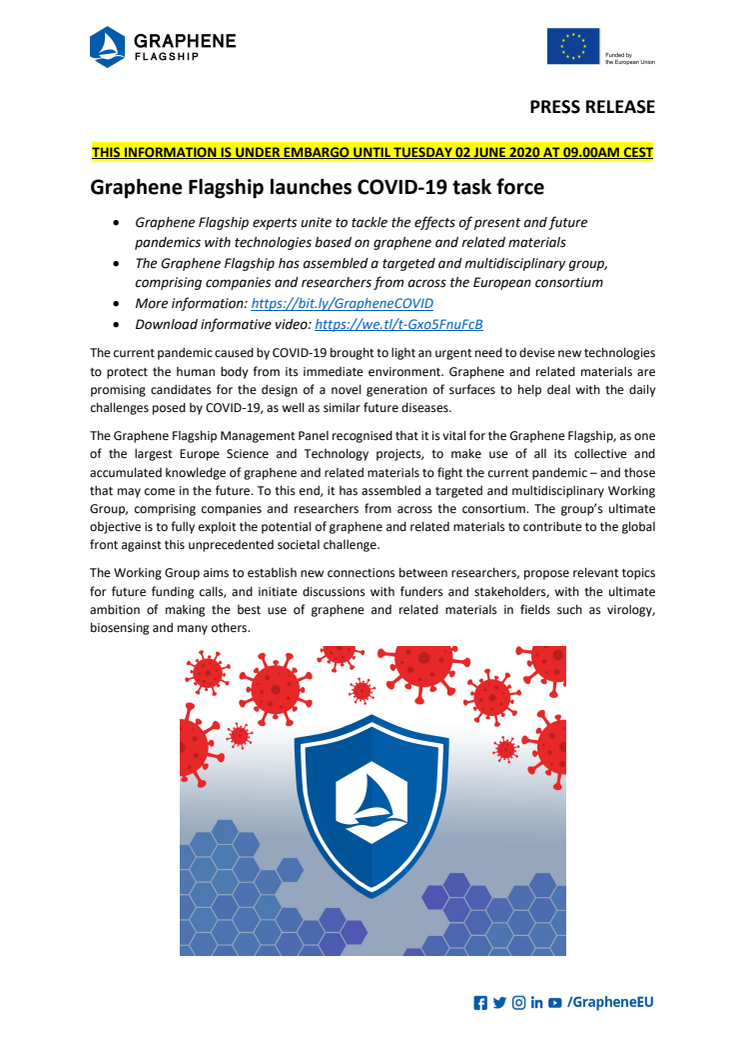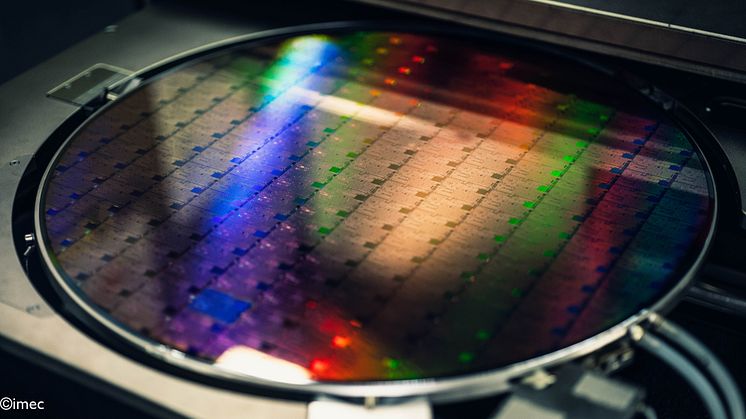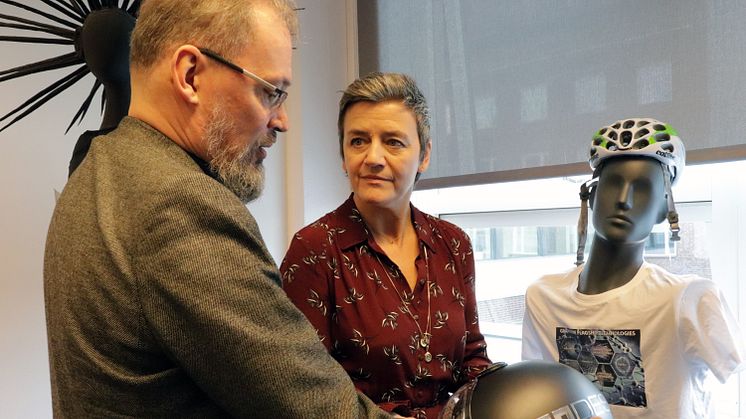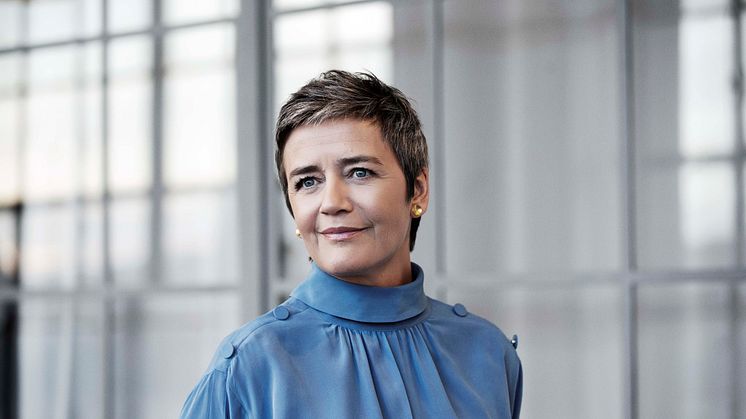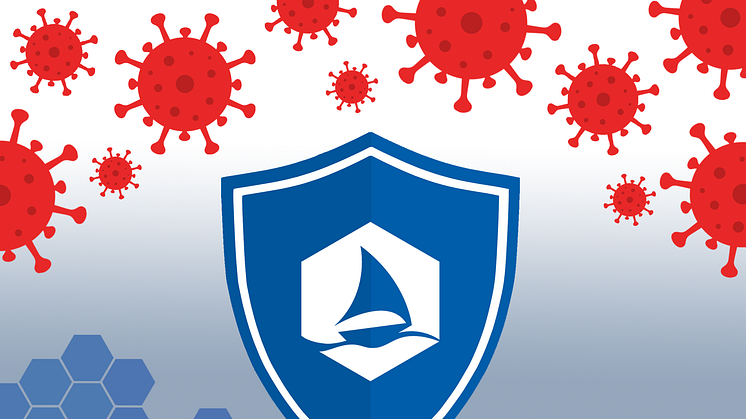
Press release -
Graphene Flagship launches COVID-19 task force
The current pandemic caused by COVID-19 brought to light an urgent need to devise new technologies to protect the human body from its immediate environment. Graphene and related materials are promising candidates for the design of a novel generation of surfaces to help deal with the daily challenges posed by COVID-19, as well as similar future diseases.
The Graphene Flagship Management Panel recognised that it is vital for the Graphene Flagship, as one of the largest Europe Science and Technology projects, to make use of all its collective and accumulated knowledge of graphene and related materials to fight the current pandemic – and those that may come in the future. To this end, it has assembled a targeted and multidisciplinary Working Group, comprising companies and researchers from across the consortium. The group’s ultimate objective is to fully exploit the potential of graphene and related materials to contribute to the global front against this unprecedented societal challenge.
The Working Group aims to establish new connections between researchers, propose relevant topics for future funding calls, and initiate discussions with funders and stakeholders, with the ultimate ambition of making the best use of graphene and related materials in fields such as virology, biosensing and many others.
The Leader of the Working Group is Alberto Bianco, Graphene Flagship Work Package Deputy for Health and Environment, and the Deputy Leader is Paolo Samorì, Graphene Flagship Work Package Deputy for Functional Foams and Coatings. The members of the working Group are Andrea Ferrari, Graphene Flagship Science and Technology Officer, Mar García-Hernández, Work Package Leader for Enabling Materials, Amaia Zurutuza, Scientific Director of Graphene Flagship Partner Company Graphenea and Work Package Deputy for Wafer-scale System Integration, Cinzia Spinato, Graphene Flagship Business Developer at Graphene Flagship Partner ICN2, and Anna Helman, Science Officer at the Flagship partner European Science Foundation. The Working Group will also include virology experts Francesco Stellacci, Professor of Supramolecular Nanomaterials and Interfaces at Flagship Partner EFPL, Arben Mercoçi, ICREA Professor at Flagship Partner ICN2 and Member of the Biomedical Technologies Work Package.
- The Working Group will have a 360-degree approach, covering fundamental to applied solutions. The group will investigate:
- The inhibition of the virus by graphene and related materials dispersed in solutions
- Whether graphene and related materials have the same capacity as antivirals as already demonstrated against bacteria
- How to modify graphene and related materials with antiviral agents
- How to design chemically tailored materials to either promote viruses’ adhesion and inhibit their biological activity once adsorbed, or repel viruses
- How to design coated surfaces better able to withstand repeated cleaning cycles
- How to formulate disinfectant solutions and detergents containing graphene and related materials to clean surfaces
- How to design disposable masks, aprons and wearable tissues, with higher impermeability to viruses
- How to develop personal protective equipment technologies able to act as a barrier between the environment and human body
- How to create smart tissue, embedding by design not only anti-viral characteristics, but also with other functions
- How to design new chemical, electrochemical and optical sensors with high specificity for early diagnostics, and for portable point-of-care devices
- The wider challenges posed by global pandemics, such as how graphene and related materials can improve remote working: for example, by improving telecoms and datacoms, or through the development of more efficient batteries for a new green society.
“We are exploring the use of graphene to inhibit the infectivity of viral particles, as well as designing multifunctional graphene conjugates for conductive surface coatings,” explains Alberto Bianco, Leader of the Graphene Flagship’s Coronavirus Working Group. The surface coatings could be effective against the virus in two ways: either by directly repelling the virus, or by promoting its adhesion and destroying it once adsorbed.
Amaia Zurutuza, Member of the Graphene Flagship’s Coronavirus Work Group and Scientific Director of Graphene Flagship industrial partner Graphenea, emphasises the importance of the group’s collaboration with leading EU companies. “Graphenea is supplying graphene for diagnostics and treatment, and we are working on a number of virus-related projects,” she explains.
“Graphene and related materials are promising candidates to develop the next generation of surfaces, to help with the daily challenges posed by the virus. The Graphene Flagship cannot and will not disregard such a major societal challenge,” comments Paolo Samorì, Deputy Leader of the Working Group.
Prof. Andrea. C. Ferrari, Science and Technology Officer of the Graphene Flagship and Chair of its Management Panel, adds: “In such a difficult and unusual time, it has never been more important to work together. The Graphene Flagship has a proven track record of delivering its promises. Many of our partners and associated members, both industrial and academic, are already working to develop new technologies based on graphene and related materials to help with the fight against COVID-19 and future pandemics. This Working Group will create many opportunities for collaborations both within and externally to the Graphene Flagship. We are convinced graphene and related materials have a role to play to help society tackle this challenging problem, and our Working Group will spearhead the Flagship’s joint efforts in this area.”
Topics
Categories
About the Graphene Flagship
The Graphene Flagship is research, innovation and collaboration.
Funded by the European Commission, the Graphene Flagship aims to secure a major role for Europe in the ongoing technological revolution, helping to bring graphene innovation out of the lab and into commercial applications. The Graphene Flagship gathers nearly 170 academic and industrial partners from 21 countries, all exploring different aspects of graphene and related materials. Bringing diverse competencies together, the Graphene Flagship facilitates cooperation between its partners, accelerating the timeline for industry acceptance of graphene technologies. The European Commission’s FET Flagships enable research projects on an unprecedented scale. With €1 billion budgets, the Graphene Flagship, Human Brain Project and Quantum Flagship serve as technology accelerators, helping Europe to compete with other global markets in research and innovation.

